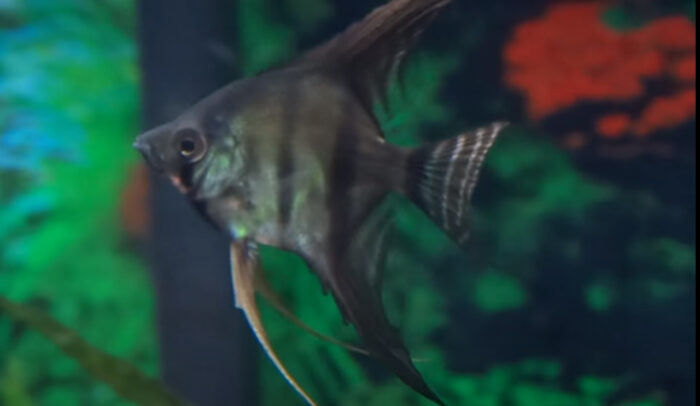Angelfish are hardy aquarium fish that are flexible in their nutritional and environmental demands. Why is my angelfish not eating?
They are greedy eaters. So, if they stop eating, it simply means something is wrong. How long can angelfish go without eating?
Allow me to explain 5 common reasons and to help your angel fish eat again.
Why Is My Angelfish Not Eating?
Angelfish will stop eating due to poor water conditions, food variety, stress, and vitamin deficiencies. The diet of wild angelfish is varied.
They consume live prey, including shrimp and other fish, because they are omnivores.
However, owners of aquariums typically simply provide their fish flakes and pellets. They eventually quit eating altogether because they become weary of eating the same thing every day.

5 Reasons Why Your Angelfish Is Not Eating
Trying to figure out why angelfish stop eating can be quite tasking for most fish keepers. However, the 5 points below provide a list of possible reasons why your angelfish might stop eating.
- Unfavorable Water Conditions
- Stress
- Food Variety
- Illness
- Lack of Vitamin
1. Unfavorable Water Conditions
Although angelfish are hardy, they still react to some drastic water chemistry changes, particularly the accumulation of organic waste. Once substances like nitrates, nitrite, and ammonia begin to accumulate in the tank, your angelfish might stop eating.
The concentrations of these chemicals are often as a result of poor water filtration. Poor elimination of organic wastes like dead plants, leftover food, and other organic wastes are the primary sources of these chemicals.
You can progressively monitor these concentrations with the use of various test kits (Available on Amazon). Regular water changes and the use of a functioning filter will keep the concentration in check.
2. Stress
When angelfish are overstressed in the tank, they might stop eating. A lot of factors can cause angelfish to be stressed in the tank. These include unwarranted and extreme water temperatures and overcrowded tanks.
The inclusion of incompatible tank mates too can stress the fish. These tank mates can bully or prey on angelfish and cause serious stress.
3. Food Variety
Although angelfish are not picky eaters, they can become bored if you feed them repeatedly with the same food over time. Lack of choice and diversity in food might make them quit eating.
You should consider diversifying the food you feed your angelfish will help them pick more interest in eating. Offering them a diversity of food that includes freeze-dried bloodworms, pellets, and flakes will help them eat better.
4. Illness
Like every other animal, angelfish can become sick too, and one of the obvious signs of illness is the loss of appetite. If you suspect illness as the reason why you angelfish stopped eating, then you should look out for other signs like:
- sluggishness
- sores
- white patches on the body and fins
- discolored gills
If you ascertain that sickness is the cause of the loss of appetite, you should take necessary steps, including quarantining the affected fish.
5. Lack of Vitamins
Lack of vitamin in your fish diet can also lead to loss of appetite. You should evaluate what you are feeding them with and check the vitamin level.

What to Do if Angel Fish Is Not Eating?
Did you recently shift things around in the tank? As a result, if you’ve changed anything within the tank, your Angelfish is likely to become angry and lose its appetite. Set everything back to how it was in the tank for the quickest solution and to get your angelfish to feed properly.
How Long Can Angelfish Go Without Eating?
An angelfish can survive for roughly a week without nourishment. However, an angelfish may survive without food for a maximum of three days without any serious health risks. Consequently, you should set up a feeding system for the angelfish if you plan a trip that will last more than three days.
Why Won’t My Angelfish Eat Flakes?
It’s possible that your angelfish is rejecting its flakes because it dislikes their flavor or texture. Some angelfish prefer pellets over flakes, however not all of them do.
This is worse if the flakes are too big and difficult for angelfish to consume. For angelfish who favor feeding near the tank bottom, sinking pellets are preferable.
How Do I Get My Angelfish to Eat?
Consider giving your Angelfish a vitamin supplement containing vitamin B12, which you can mix with water and the fish will consume through their gills. Since vitamin B12 increases appetite, your fish should resume eating after about two doses.
Do Angelfish Eat Everyday?
Yes. Angelfish can be fed more pellets and flakes as they become older.
- Younger angelfish should generally eat three to four times daily.
However, after they reach their full size, reduce the amount of food and adhere to a rigid schedule. If fed excessively, angelfish will overeat and put on weight.
Additionally, live and frozen items can be given as rewards or to encourage spawning. For maximum results, change their diet every day and only give them once or twice a day what they can take in 2 to 3 minutes.
Conclusion
Feeding is an integral part of angelfish’s development, and their lack of appetite might signal an existing or a potential problem. Identifying the reason why your angelfish stopped eating is the first step to finding a lasting solution.
Thanks for visiting HelpUsFish.com for this article. Check out our home page and search bar with hundreds of aquatic or marine life articles to choose from. Bye for now!
Table of Contents
